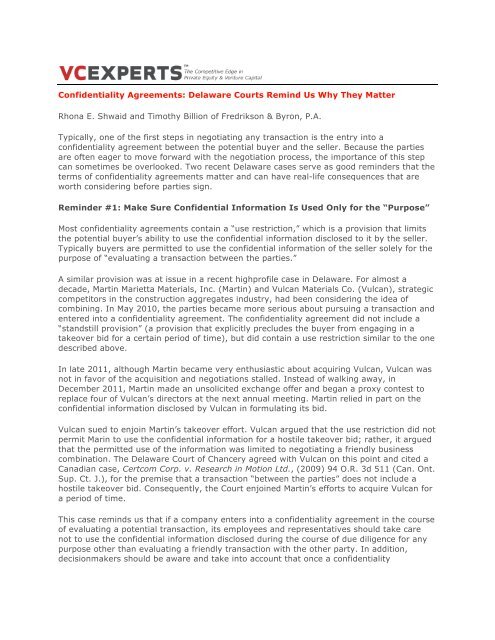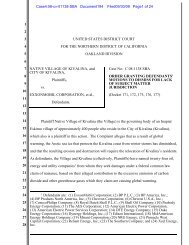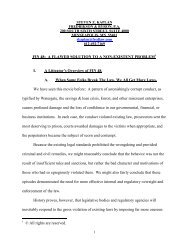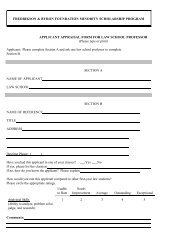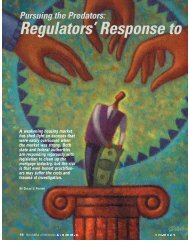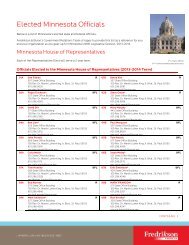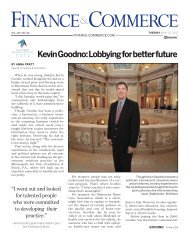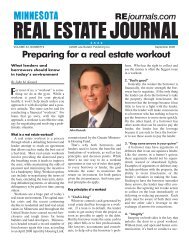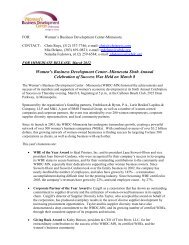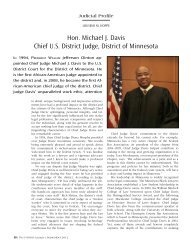Confidentiality Agreements: Delaware Courts Remind Us Why They ...
Confidentiality Agreements: Delaware Courts Remind Us Why They ...
Confidentiality Agreements: Delaware Courts Remind Us Why They ...
You also want an ePaper? Increase the reach of your titles
YUMPU automatically turns print PDFs into web optimized ePapers that Google loves.
<strong>Confidentiality</strong> <strong>Agreements</strong>: <strong>Delaware</strong> <strong>Courts</strong> <strong>Remind</strong> <strong>Us</strong> <strong>Why</strong> <strong>They</strong> Matter<br />
Rhona E. Shwaid and Timothy Billion of Fredrikson & Byron, P.A.<br />
Typically, one of the first steps in negotiating any transaction is the entry into a<br />
confidentiality agreement between the potential buyer and the seller. Because the parties<br />
are often eager to move forward with the negotiation process, the importance of this step<br />
can sometimes be overlooked. Two recent <strong>Delaware</strong> cases serve as good reminders that the<br />
terms of confidentiality agreements matter and can have real-life consequences that are<br />
worth considering before parties sign.<br />
<strong>Remind</strong>er #1: Make Sure Confidential Information Is <strong>Us</strong>ed Only for the “Purpose”<br />
Most confidentiality agreements contain a “use restriction,” which is a provision that limits<br />
the potential buyer’s ability to use the confidential information disclosed to it by the seller.<br />
Typically buyers are permitted to use the confidential information of the seller solely for the<br />
purpose of “evaluating a transaction between the parties.”<br />
A similar provision was at issue in a recent highprofile case in <strong>Delaware</strong>. For almost a<br />
decade, Martin Marietta Materials, Inc. (Martin) and Vulcan Materials Co. (Vulcan), strategic<br />
competitors in the construction aggregates industry, had been considering the idea of<br />
combining. In May 2010, the parties became more serious about pursuing a transaction and<br />
entered into a confidentiality agreement. The confidentiality agreement did not include a<br />
“standstill provision” (a provision that explicitly precludes the buyer from engaging in a<br />
takeover bid for a certain period of time), but did contain a use restriction similar to the one<br />
described above.<br />
In late 2011, although Martin became very enthusiastic about acquiring Vulcan, Vulcan was<br />
not in favor of the acquisition and negotiations stalled. Instead of walking away, in<br />
December 2011, Martin made an unsolicited exchange offer and began a proxy contest to<br />
replace four of Vulcan’s directors at the next annual meeting. Martin relied in part on the<br />
confidential information disclosed by Vulcan in formulating its bid.<br />
Vulcan sued to enjoin Martin’s takeover effort. Vulcan argued that the use restriction did not<br />
permit Marin to use the confidential information for a hostile takeover bid; rather, it argued<br />
that the permitted use of the information was limited to negotiating a friendly business<br />
combination. The <strong>Delaware</strong> Court of Chancery agreed with Vulcan on this point and cited a<br />
Canadian case, Certcom Corp. v. Research in Motion Ltd., (2009) 94 O.R. 3d 511 (Can. Ont.<br />
Sup. Ct. J.), for the premise that a transaction “between the parties” does not include a<br />
hostile takeover bid. Consequently, the Court enjoined Martin’s efforts to acquire Vulcan for<br />
a period of time.<br />
This case reminds us that if a company enters into a confidentiality agreement in the course<br />
of evaluating a potential transaction, its employees and representatives should take care<br />
not to use the confidential information disclosed during the course of due diligence for any<br />
purpose other than evaluating a friendly transaction with the other party. In addition,<br />
decisionmakers should be aware and take into account that once a confidentiality
agreement is entered into with the potential target, the company’s flexibility to engage in a<br />
hostile takeover bid of the target at a later time may be greatly diminished.<br />
<strong>Remind</strong>er #2: A Seller Might Lie During Due Diligence and the Buyer Probably<br />
Can’t Do Much About It<br />
Another common provision in confidentiality agreements is a non-reliance clause. This type<br />
of clause typically states that a buyer may not rely on the completeness or accuracy of any<br />
information provided by the seller during due diligence, and that no sale contract exists<br />
between the buyer and the seller unless and until the parties enter into a definitive<br />
agreement. What happens when a seller is not completely forthcoming with a buyer during<br />
due diligence? Does the buyer have any recourse?<br />
The <strong>Delaware</strong> courts recently addressed these questions. In the case RAA Management LLC<br />
v. Savage Sports Holdings, Inc., Del., No. 577, 2011 (decided May 18, 2012), Savage<br />
approached RAA to discuss a possible merger and the parties entered into a confidentiality<br />
agreement. The agreement stated that Savage made no representations about the accuracy<br />
or completeness of any information it provided to RAA, and that Savage would not be liable<br />
to RAA based on RAA’s reliance on such information, unless Savage breached any<br />
representations or warranties made in a later sale agreement. Additionally, RAA waived any<br />
claims against Savage relating to the potential transaction unless and until the parties<br />
entered into a sale agreement.<br />
At the beginning of the discussions between Savage and RAA, Savage stated that there<br />
were “no significant unrecorded liabilities or claims against Savage.” However, during RAA’s<br />
due diligence process, Savage disclosed three major liabilities, which ultimately caused RAA<br />
to abandon the transaction. RAA sued, alleging that, had it known of those liabilities at the<br />
outset, it never would have pursued the negotiations and that because Savage had<br />
knowingly covered up the liabilities earlier in the process, Savage should be liable for the<br />
$1.2 million in costs that RAA incurred in performing its due diligence.<br />
The <strong>Delaware</strong> court dismissed the complaint based on the nonreliance and waiver clauses.<br />
On appeal, RAA argued that the nonreliance clause barred claims based on negligence or<br />
mistake, but should not be extended to cover fraudulent or intentional misrepresentations.<br />
Additionally, RAA argued that the Court should not enforce the nonreliance clause on policy<br />
grounds because such a rule would give sellers an incentive to lie during the initial stages of<br />
a transaction.<br />
The <strong>Delaware</strong> Supreme Court rejected RAA’s arguments, finding that the language of the<br />
agreement made no distinction between negligence and fraud, and that <strong>Delaware</strong>’s public<br />
policy favors enforcing written nonreliance clauses. The Court noted that, at the time of the<br />
agreement, both parties knew how nonreliance clauses had been interpreted by <strong>Delaware</strong><br />
courts and that RAA could not escape the terms it agreed to in its written agreement.<br />
The RAA case serves to remind us that, while due diligence is a tool designed to help buyers<br />
evaluate a possible transaction, buyers should not rely on statements or materials provided<br />
by a seller during due diligence. Many confidentiality agreements preserve the seller’s ability<br />
to limit its liability with respect to the quantity, quality, and timing of disclosures made<br />
during the due diligence process, perhaps even in the case where the seller makes<br />
fraudulent or misleading statements.
If a buyer uncovers unknown liabilities during due diligence, it will probably not be able to<br />
recover the expenses it incurred in order to make that discovery. However, the buyer may<br />
be able to limit its exposure to those liabilities by adequately allocating risk in the definitive<br />
agreement, which will be binding upon the seller. If a buyer finds that the seller’s actions or<br />
omissions are particularly egregious during due diligence, its ultimate remedy may be to<br />
walk away from the deal. Although this may seem like a disappointing result at the time, in<br />
the end, it means that the due diligence process worked.<br />
Timothy Billion was a 2012 Summer Associate.<br />
Rhona E. Shwaid, rshwaid@fredlaw.com<br />
Rhona is a shareholder in Fredrikson & Byron’s Mergers & Acquisitions and Life Sciences<br />
Groups, and is Co-Chair of the Commercial Law Practice Group.<br />
Rhona represents private and publicly-held corporations as both buyers and sellers in a<br />
variety of corporate transactions, such as mergers, stock purchases, asset purchases,<br />
divestitures, minority investments and other strategic arrangements. In addition to<br />
“healthy” M&A deals, she has experience with M&A deals involving distressed companies.<br />
She regularly assists clients with a variety of commercial contracts, including supply and<br />
manufacturing agreements, distribution agreements, services agreements, development<br />
agreements and other arrangements that are critical for the smooth exchange of goods and<br />
services between businesses.<br />
Full Bio (http://www.fredlaw.com/bios/attorneys/shwaidrhona/)<br />
Fredrikson & Byron, P.A.<br />
At Fredrikson & Byron, (www.fredlaw.com) we’ve built a reputation as the firm “where<br />
law and business meet” by bringing business acumen and entrepreneurial thinking to our<br />
work with clients, and by operating as business advisors and strategic partners as well as<br />
legal counselors.<br />
A proactive, problem-solving perspective runs throughout our service areas, from our<br />
traditional legal areas of support like litigation, real estate and intellectual property to our<br />
more consultative practices like government relations and health care consulting. It’s a<br />
perspective that enables us to understand and keep client objectives firmly in perspective,<br />
and to anticipate and address problems before they arise.<br />
Material in this work is for general educational purposes only, and should not be construed<br />
as legal advice or legal opinion on any specific facts or circumstances, and reflects personal<br />
views of the authors and not necessarily those of their firm or any of its clients. For legal<br />
advice, please consult your personal lawyer or other appropriate professional. Reproduced<br />
with permission from Fredrikson & Byron, P.A.. This work reflects the law at the time of<br />
writing in August 2012.


